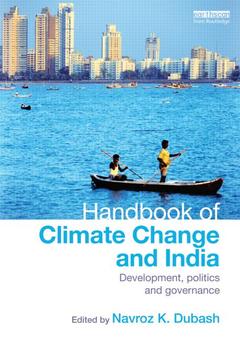Description
Handbook of Climate Change and India
Development, Politics and Governance
Routledge Environment and Sustainability Handbooks Series
Coordinator: Dubash Navroz K.
Language: English
Subjects for Handbook of Climate Change and India:
Keywords
Climate Change in India; Global warming in India; India's climate; Policy debate in India; Sea Water; National Action Plan; PTI; CDM Project; Tamil Nadu; IPCC Process; IPCC Bureau; Co-benefits Approach; Indian Climate Politics; Climate Change; Capita GHG Emission; Bali Action Plan; GHG Emission; Energy Efficiency; Energy Sources; IIT Delhi; India's Climate Policy; JFM Committee; Carbon Space; Climate Diplomacy; Mitigate GHG Emission; GAMS Code; Ozone Layer Depletion; GHG Mitigation; Gdp Growth
Publication date: 11-2011
Support: Print on demand
Publication date: 06-2015
· 17.4x24.6 cm · Paperback
Description
/li>Contents
/li>Biography
/li>
How do policymakers, businesses and civil society in India approach the challenge of climate change? What do they believe global climate negotiations will achieve and how? And how are Indian political and policy debates internalizing climate change? Relatively little is known globally about internal climate debate in emerging industrializing countries, but what happens in rapidly growing economies like India?s will increasingly shape global climate change outcomes.
This Handbook brings together prominent voices from India, including policymakers, politicians, business leaders, civil society activists and academics, to build a composite picture of contemporary Indian climate politics and policy. One section lays out the range of positions and substantive issues that shape Indian views on global climate negotiations. Another delves into national politics around climate change. A third looks at how climate change is beginning to be internalized in sectoral policy discussions over energy, urbanization, water, and forests. The volume is introduced by an essay that lays out the critical issues shaping climate politics in India, and its implications for global politics.
The papers show that, within India, climate change is approached primarily as a developmental challenge and is marked by efforts to explore how multiple objectives of development, equity and climate mitigation can simultaneously be met. In addition, Indian perspectives on climate negotiations are in a state of flux. Considerations of equity across countries and a focus on the primary responsibility for action of wealthy countries continue to be central, but there are growing voices of concern on the impacts of climate change on India. How domestic debates over climate governance are resolved in the coming years, and the evolution of India?s global negotiation stance are likely to be important inputs toward creating shared understandings across countries in the years ahead, and identify ways forward. This volume on the Indian experience with climate change and development is a valuable contribution to both purposes.
Part 1: Climate Science and Potential Impacts Part 2: Past as Prologue: Early Indian Perspectives on Climate Change Part 3: The International Climate Negotiations: Stakes, Debates and Dilemmas Part 4: Domestic Politics of Climate Change Part 5: Integrating Climate Change and Development: A Sectoral View Part 6: Looking into the Future
Navroz K. Dubash is a Senior Fellow at the Centre for Policy Research, New Delhi.
His current work examines climate change as a problem of multi-level governance by
focusing on domestic regulatory changes in environmentally-sensitive sectors. He also
works on the political economy of energy in India and Asia, international climate
change negotiations, the role of civil society in global environmental governance, and
water governance. He is currently a member of India’s Expert Committee on Low
Carbon Strategies for Inclusive Growth, a lead author for the Fifth Assessment Report
of the Intergovernmental Panel on Climate Change, and he also serves on the editorial
boards of several international journals.
His recent publications include a co-edited special issue of Climate Policy entitled
‘Beyond Copenhagen’ and a co-edited special issue on Global Energy Governance for
the journal Global Policy He has a long history of engagement with civil society
organizations, including as the first international coordinator of the Climate Action
Network, from 1990–92.
Navroz holds PhD and MA degrees in Energy and Resources from the University of
California, Berkeley, and an AB in Public and International Affairs from Princeton
University.
These books may interest you

Pathologies of Climate GovernanceInternational Relations, National Politics and Human Nature 82.73 €



